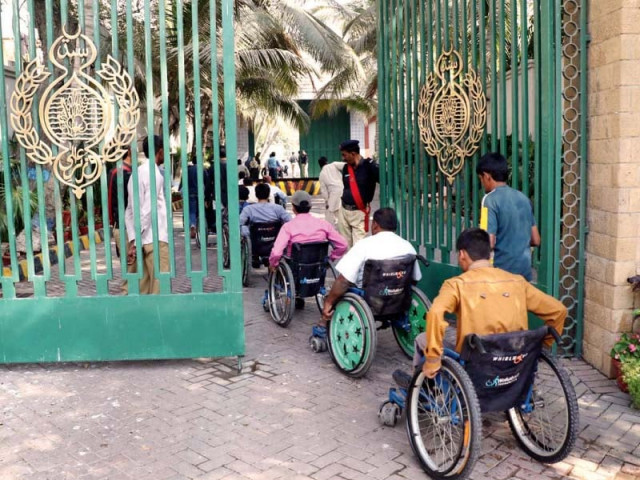Sindh’s differently-abled persons await legal safeguard
Govt is yet to act on many promises it made to the province’s differently-abled in 2018

When the provincial government unveiled its Sindh Empowerment of Persons with Disabilities law, in 2018, it was hoped that the landmark ruling would herald a new dawn for people with special needs.
The new edict, albeit unique, envisioned a life free of discrimination- one where every disabled person in the province had the right to dignity, self-determination and equal opportunities. “No person shall be deprived of his/her personal liberty, only on the grounds of disability,” the law proclaimed. Adding further, it also promised to take ‘extraordinary steps to ensure effective inclusiveness of all disabled persons, through education, skills development and a five per cent job quota to ascertain employment. However, three years down the line, little of what was then envisioned seems to have translated into reality. It appears, amid the tall claims and reassuring lip-service, the law has largely gone without any significant enforcement within the province.
While persons with disability, whom the said law defined as those with long-term physical, mental, intellectual or sensory impairment, are yet waiting to experience a sliver of all that was once promised. The 2018 edict, among other things, had promised to take extra measures to expedite the legal process for the differently abled. “For the purpose of speedy justice, the government shall, with the concurrence of chief justice of Sindh High Court, establish special courts for disable persons,” touted a clause in the law. But as they say, promises, like pie crust, are meant to be broken. As of the filing of this report, no such court appears to have been set up in the last three years.
Whereas, looking for any indication of a government authority responsible for the protection of disabled persons, like pledged in the law, has too been but a wild goose chase. According to the officials, the United Nations General Assembly (UNGA), adopted its Convention on the Rights of Persons with Disabilities in December 2006, which Pakistan, almost five years later in October 2011. The law, passed under UN convention recommendations, among other things, promises access to shelter with good living conditions in terms of safety, sanitation, health care and counselling for disabled persons and children who have no place to live. The ratified convention, also mandates the government to establish a Special Employment Exchange Portal, to which every public and private firm shall furnish information regarding vacancies earmarked for persons with disabilities. In addition to that, the law also required those registered with the portal for more than two years, access to an unemployment allowance.
However, like the portal the allowance too remains a pipe dream for the country’s disabled persons. Furthermore there is yet no proper data for disabled persons living in the province, which paints a stark question mark on the government’s seriousness about the provincial law. Although different international organisations have claimed different figures in the regard, much of them also remain disputed by both, the federal and the provincial governments. In an attempt to find a resolve to the disputed statistics, the provincial government law had promised to conduct an in-depth research and issue a definitive number of persons with various disabilities, living in Sindh. Although, no government-backed data has come to fore since then, but according to the Benazir Income Support Program, 50,673 people in the province are legally blind, 21,722 are hearing impaired, 69,150 are diagnosed with mental disorder, 35,631 are mute, while over 182,820 have some form of physical disability. Speaking in the regard, Abid Lashari, who heads a non-profit NGO called The National Disability and Development Forum, said that where the provincial government is often quick to draft laws, it is the implementation of the law which it struggles with.
“Oddly enough, most of Sindh’s disabled persons don’t even know that a law like such even exists. And people are not aware of the law, how are they expected to benefit from it?” said lashari. “Which is why we are currently working with various international organisations to launch a mass-media campaign to bring the law into public consciousness,” he added. On the other hand however, Sindh Minister for Information Nasir Hussain Shah, yet appears to consider the edict a provincial success. Claiming implementation, he said that his government has introduced a separate department to address all affairs related to disabled persons. “The five per cent quota is in effect across all government departments, which the chief minister himself is keen about. We have almost finalised the remaining rules too, which will soon be implemented in Sindh,” he asserted in a press briefing.



















COMMENTS
Comments are moderated and generally will be posted if they are on-topic and not abusive.
For more information, please see our Comments FAQ